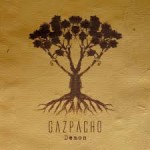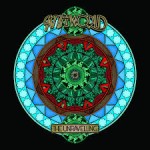People always travel considerable distances to Mostly Autumn’s York gigs, and Cloud Atlas took advantage of many fans making a weekend of it to put on a gig of their own the following night at The Post Office Social Club, and they succeeded in pulling a respectable sized crowd containing a lot of familiar faces.
Sadly the advertised support, one-time Seahorse Chris Helme, had to pull out as short notice, but former Stolen Earth guitarist Adam Dawson was able to step into the breach as a late replacement. He played a mixture of originals and covers, ending with Stolen Earth’s “Mirror, Mirror” and “Silver Skies”, and finally the never recorded “Harlequin” recorded as a duet with Heidi Widdop.
Stolen Earth themselves began with an extended drone of keys, whistles and E-bowed guitar before launching into the distinctive riff of “Searchlight”. The proceeded to deliver one of the best performances I’ve seen them do, helped by an excellent sound mix. Dave Randall on keys was particularly impressive with swirling colours and textures, as was bassist Stu Carver; the band have a very tight rhythm section.
Set-wise it was much the same as at Bilston in August, drawn from the album “Beyond the Vale” plus Heidi’s solo acoustic cover of Michael Jackson’s “Billie Jean” and the Stolen Earth oldie “Soul in a Jar”. One change was a rearrangement of the middle section of “Let the Blood Flow” with an electronica element that worked far better than the original. This time the band remembered to save one song for the encore, ending the evening with the epic “Stars”.
Cloud Atlas have one more gig scheduled this year, supporting Lifesigns at York’s Fibbers, after which they will be working on their second album.








 Yet another York-based band (Is there something in the water?), Cloud Atlas is the band put together by Heidi Widdop following the dissolution of Stolen Earth. Their impressive début album is big widescreen rock with an epic scope, with Heidi’s distinctive bluesy vocals setting them apart from many of their obvious peers. But this album’s sound is as much about Martin Ledger’s soaring melodic lead guitar, with strong echoes of Marillion’s Steve Rothery.
Yet another York-based band (Is there something in the water?), Cloud Atlas is the band put together by Heidi Widdop following the dissolution of Stolen Earth. Their impressive début album is big widescreen rock with an epic scope, with Heidi’s distinctive bluesy vocals setting them apart from many of their obvious peers. But this album’s sound is as much about Martin Ledger’s soaring melodic lead guitar, with strong echoes of Marillion’s Steve Rothery. Norway’s Gazpacho have come up with one of the darkest and most sinister-sounding records of 2014. It’s what Talk Talk’s Spirit of Eden might have sounded like if Mark Hollis had spent a lot of time listening to Black Sabbath. Sinister violin-led pastoral soundscapes with are intercut with bursts of hard rock, motifs recur across the album, and there’s even an irruption of accordion-led central European folk at one point. An ambitious album which is by no means an easy listen, but one where you can keep finding new layers after many listens.
Norway’s Gazpacho have come up with one of the darkest and most sinister-sounding records of 2014. It’s what Talk Talk’s Spirit of Eden might have sounded like if Mark Hollis had spent a lot of time listening to Black Sabbath. Sinister violin-led pastoral soundscapes with are intercut with bursts of hard rock, motifs recur across the album, and there’s even an irruption of accordion-led central European folk at one point. An ambitious album which is by no means an easy listen, but one where you can keep finding new layers after many listens. A major step forward for Kavus Torabi’s eight-piece band, and reflects their current live sound far more than any of their previous recordings. It’s a record that takes psychedelia, jazz, hard rock and all kinds of other things, and puts them in a blender to produce something that sounds quite unlike anyone else. Fans of the late, great Frank Zappa should find a lot to like about this record, as should anyone who thinks there should be more bassoons in rock.
A major step forward for Kavus Torabi’s eight-piece band, and reflects their current live sound far more than any of their previous recordings. It’s a record that takes psychedelia, jazz, hard rock and all kinds of other things, and puts them in a blender to produce something that sounds quite unlike anyone else. Fans of the late, great Frank Zappa should find a lot to like about this record, as should anyone who thinks there should be more bassoons in rock. Luna Rossa started out as a side-project from Panic Room emphasising the acoustic side of Anne-Marie Helder’s and Jon Edwards’ music, but seems to have taken on a life of it’s own. Their second album is a logical progression from the first; perhaps not quite as eclectic, but with a slightly clearer musical identity. Luna Rossa still defy easy genre pigeonholing, though the album does show occasional hints of artists as varied as Goldfrapp and Renaissance. There’s some very raw heart-on-sleeve emotion, with the music revolving around and complementing Anne-Marie’s always remarkable vocals.
Luna Rossa started out as a side-project from Panic Room emphasising the acoustic side of Anne-Marie Helder’s and Jon Edwards’ music, but seems to have taken on a life of it’s own. Their second album is a logical progression from the first; perhaps not quite as eclectic, but with a slightly clearer musical identity. Luna Rossa still defy easy genre pigeonholing, though the album does show occasional hints of artists as varied as Goldfrapp and Renaissance. There’s some very raw heart-on-sleeve emotion, with the music revolving around and complementing Anne-Marie’s always remarkable vocals. This Kickstarter-funded project is Steve Rothery’s first proper solo album in more than three decades as lead guitarist of Marillion. It’s an instrumental album with a band including Panic Room’s Yatim Halimi and Mr So and So’s Dave Foster, Rothery’s lyrical and emotional playing both soars and rocks, the numbers building in intensity from slow-burning beginnings. The whole thing shows just why Rothery is one of the best guitarists of his generation, one of the few players good enough to pull this sort of thing off without descending into self-indulgence.
This Kickstarter-funded project is Steve Rothery’s first proper solo album in more than three decades as lead guitarist of Marillion. It’s an instrumental album with a band including Panic Room’s Yatim Halimi and Mr So and So’s Dave Foster, Rothery’s lyrical and emotional playing both soars and rocks, the numbers building in intensity from slow-burning beginnings. The whole thing shows just why Rothery is one of the best guitarists of his generation, one of the few players good enough to pull this sort of thing off without descending into self-indulgence.